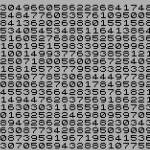19 men & Asohel – B’chukkotai
 We are all impressed by large numbers.
We are all impressed by large numbers.
How many refugees are there from a war region… how many martyrs of the Holocaust… how many killed in the defence of Israel…?
The Torah also talks numbers. For example, this week’s sidra says, “Five of you shall chase a hundred, and a hundred of you shall chase ten thousand; and your enemies shall fall before you by the sword” (Lev. 26:8).
Yet when we quote these large numbers we tend to leave something out.
Writing in the B’nai B’rith magazine, “Jewish Heritage” (Winter 1969/70), Rabbi Jack Riemer describes a civil war in ancient Israel (II Samuel 2).
One side was led by Yoav, the other by Avner. With Yoav were his two younger brothers, Avishai and Asohel.
As the battle proceeded, Avner speared Asohel and pierced him through. After the battle the fallen were counted.
Of Avner’s army, 360 had died; of Yoav’s, “nineteen men were dead… and Asohel“.
Rabbi Riemer writes, “Instead of saying twenty, they said it this way because Asohel was not just a number. He was no mere statistic. He was Yoav’s brother. Because he was a person whom he loved, his death has to be told to him separately.”
Here is the great tragedy of war: generals and politicians and reporters become so caught up in numbers that they measure success by statistics and they count losses in numbers.
They forget that to the mother or wife or brother of each one fallen, the battle is tragedy and catastrophe. They think that if the other side has lost 360 men while their side has lost “only” twenty, then their side has won.
Actually both sides have lost, and what they have lost are not numbers but human beings.
They have lost Asohels, men with names and faces and families and souls… Each person who dies in battle has a name as well as a number.
The rabbis say in the Mishnah (Sanh. 4:5), “Whoever destroys one human life has destroyed a world”. That is why you cannot really say Kaddish for the six million martyrs unless you say it six million times, one for each world that was destroyed.
That is why Holocaust remembrance has come to include the readings of names of the martyrs, to remind us that each was an individual who lived, loved, and laughed.
That is why Golda Meir said that the one thing for which she could not forgive the Arabs was that by attacking Israel, they made it impossible for Israelis not to take life - the life of sons, husbands, brothers and fathers, and of daughters, wives, sisters and mothers, each a human being, each a human microcosm.
That is why we have to try to prevent war and destruction, so that human beings on all sides can live and sit under their own vine or fig tree, with none to make them afraid (Micah 4:4).



